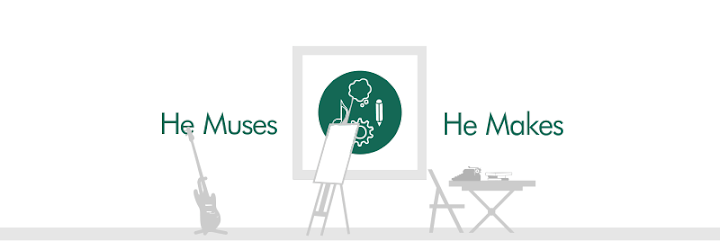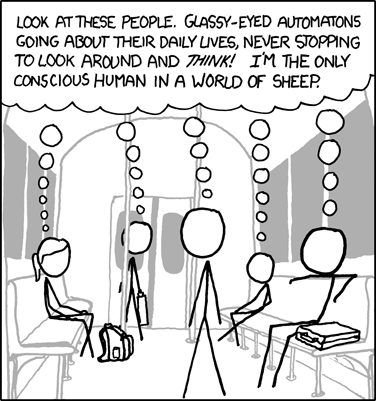
This originally appeared on misteragyeman.blogspot.com on November 17, 2015.
You better hope you’re falling
When you look up and see brown…
That’s the first two lines of a song that almost came to me on Saturday. I have no idea what it means. I have a vague idea, but it involves excrement. So I hope it isn’t that.
It’s probably that.
The world seems to make less sense every day. On Saturday I woke up to the news from Paris. On Sunday I woke up to the backlash on Facebook. Yesterday I found myself on Snopes.com restoring my sanity, and then today we’re watching US states choosing to fight fear with fear. And because the world isn’t a TV show, other events don’t pause while we deal with this one. After a while, if you’re lucky enough to be removed from the mess, it becomes very easy to wring your hands a couple of times, shake your head at all the sadness and just let it go for your own sanity. Within seconds of seeing images of destruction and mayhem, you can be laughing at a delightful GIF of a Minion. Che sarà, sarà; a toss of the head, contessa, and life can go on.
It does, more’s the pity.
Our world is a relative one. Even our most perfect laws don’t quite dovetail together, because our experience is so limited. We try to cover it up with bigger and bigger Band-Aids, until we trust the state more than we do ourselves. In such a world, where ‘idealist’ is a derogatory term, it’s often pleasant to settle. If you don’t, you’re just a wet blanket. After all, you’re not making it better by pointing it out. Still, I do. Because I don’t like the me who is comfortable in this mess. If Life gets stupid, I’m not going with it.
I recently discovered ‘The Fallacy Ref’, and was surprised at how useful I found his memes. So let’s shake the ridiculous pillars of existence, just as a thought exercise.
1. One of our best weapons against disease is disease. Doctors call it immunization. Mountain climbers call it acclimatization. It’s basically the same thing as teaching a victim of abuse to roll with the punches. We carry over this rationale into education and security and everything important in life. ‘This thing sucks’, we say, ‘so learn to take it until it doesn’t suck quite as hard’. It makes us feel less guilty when we give in to something„ because we say that it’s better to walk into the mess than to get dragged. That distracts from the fact that the mess is still a mess. We know it, though, deep inside. Which is why when somebody tries to defeat the problem from the roots, we put so much thought and energy into our discouraging advice.
2. The action inspires the reaction. It’s so true that they say that in the olden days of the romantic pitched battle, nine times out of ten the first party to attack gets defeated. We’ve become excellent at dealing with things as they crop up, making the best of our imprisonment in time. Our reflex memory protects us, but makes us vulnerable. As a kid I found it unbearable that practical jokers could make me flinch by faking a punch. In much the same way, evil people take small steps that trigger big reactions from us. They’ve learned to push our buttons, to force us to speak their language.
3. We are who we are. The finite nature of life is its greatest curse. We only understand things from our point of view. We grow, but that only means that we are condemned to know that we were dumb yesterday, though we still fail to understand that we are dumb today. Because we are, you know.
We are all quite stupid.
It’s okay to be offended by that. Just don’t get too offended, because that suggests that you are satisfied with your current self. Don’t be; do yourself a favour and drop the self-esteem line. We wallow in ignorance.
The path to so-called enlightenment often looks like this, in my experience: first you start wondering if things make sense. Then you decide that people don’t make sense. Then the barrier comes: how to take the logical step and realize that you are a person, and part of the problem. That you are, and therefore you do not think.

I started reading about the philosophy and psychology of humanity as a kid. Not the big boys like Kant and Socrates; that would make me a genius. No, the baby eBooks aimed at people looking to climb the corporate ladder. I wanted to learn enough to win friends and influence people. What did I actually get from all that? I discovered last week that I clasp my hands behind my back when I feel insecure in public. (Which is basically all the time.) I learned that from one of those books — powerful people, like royalty, create a bubble of personal space by withdrawing contact. It both insulates you and disorients others. And I picked this up, and used it to perpetuate my social ineptitude.
That’s what stupidity does to us. It holds us back. We want to be nice, thoughtful people, but that silly thought tells us that this person isn’t worthy of our niceness or empathy. Here’s a good rule I learned from dealing with children: wrap every negative situation in a little bubble, and deal with it in there. If you succeed — I rarely do — you’ll find you get much better results, with children and common humans alike. When an ignorant person says something useful, don’t chafe against it. If a mean person holds you in a debt of gratitude, give them the satisfaction. You’ll get yours back as well. Don’t use people’s weaknesses against them; if someone acts wrongly because of you, you should be ashamed. Never convince yourself that it is okay to do something dumb ‘for a good cause’. Snopes is full of people doing this, and it always makes you feel unclean. This feeling often makes people rebel against good causes because of its bad proponents or beneficiaries. Don’t do that either.
On the path to enlightenment we invariably reach a point where we learn to parrot ‘there is never one right answer’. It’s a lie. It’s a useful lie that we use to remind ourselves that we’re all stupid. But there usually is a right answer, even when our world is too complicated for it to show itself. Believe in the right.
Don’t be stupid.
Leave a Reply